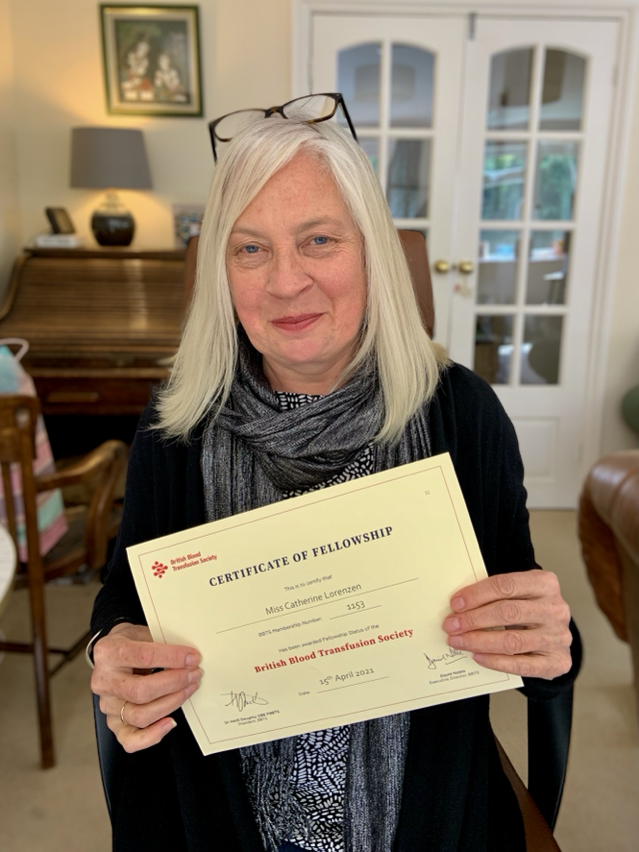
Catherine hangs up her white coat after four decades
A biomedical scientist is hanging up her white coat after more than 40 years working in pathology.
Catherine Lorenzen retires as East Kent Hospitals’ chief biomedical scientist for blood transfusion next week, after initially applying for a trainee BMS role on a whim 42 years ago.
She had been planning to study human biology at university but saw an advert in a local paper for a job in the pathology lab at Buckland Hospital in Dover.
She said: “I always knew I wanted to help people, I just didn’t know how. I wasn’t sure if human biology was exactly what I wanted to do so when I saw the advert the summer before I was due to start university, I decided to apply and see what transpired.
“The job meant I could go to college part-time, earn a wage and be part of the patient care pathway – a bit like the current Level 6 healthcare apprenticeships.”
Catherine joined the Buckland Hospital pathology team in 1983, studying at Bromley College of Technology (now part of the University of Greenwich). After completing an HND, she went on to study professional qualifications and became a Fellow of the Institute of Biomedical Science, specialising in blood transfusion, in 1987.
She then left the UK and worked for an American research hospital in the Middle East, before returning to the NHS several years later.
Catherine said: “The jump from a small district general hospital like Buckland to a vast American research hospital was phenomenal.
“They were studying things that were only just being talked about in the UK. It really opened my eyes to the fast-pace of medical research.
“But the NHS back in the 1980s was a world away from what we have now. We had no computers, no mobile phones, very little documented health and safety, and all the requests arrived in the lab on paper forms.
“The lab had two full-time admin staff whose job included trying to decipher doctors’ handwriting, tearing off the paper slips and putting them envelopes so the results could be sent back to the clinician and then filing all the back copies. We had rooms full of filing cabinets!”
Even using the analysers required a lot of human input with samples needing to be uncapped and loaded on by hand, then removed, recapped and stored. These processes are now almost entirely automated, and teams can cope with a hugely increased work load as a result.
Catherine said: “It was very labour intensive and not streamlined at all. The results were sent by post meaning that there would be an inevitable delay in the clinician receiving them, not like today when results are transmitted back to the requestor immediately.
“We would always call if a result was urgent or abnormal but that would be using the landline and hoping that the doctor was available and near the phone!
“The NHS hierarchy was very rigid and junior staff were not encouraged to make suggestions or challenge old ideas.
“Now we are all encouraged to think of new and better ways of doing things to deliver a better service to our patients.”
Although Catherine is retiring, she has no plans for a rest – she will take on a new part-time role as education and training lead for Kent and Medway Pathology Network. She also plans to continue with her positions as chair of two specialist national groups and a member of another national panel, and hopes to spend more time with her dogs and her family.
She said: “My big passion is training and helping to encourage people into our profession. I think this process could be streamlined and opened up to make the access to biomedical science even more diverse.
“Biomedical science is vital in up to 85 per cent of all patient diagnoses in the community and in hospitals making it hugely important to patient care, treatment and monitoring.
“I don’t think that everyone knows that pathology is open 24/7 - no one really sees how busy we are because we don’t have a waiting room full of patient samples!”
Catherine said she had loved every day of her career, adding: “It has been a real privilege to be able to make a difference to patient care and to be part of a community of biomedical scientists who contribute so much to healthcare.
“I have worked with some immensely talented colleagues who have inspired and motivated me and I really hope that I have been able to do the same for others.
“But at some point every biomedical scientist has to hang up their lab coat and now is that time for me.”
Interested in working with us? See our careers information to find out more.